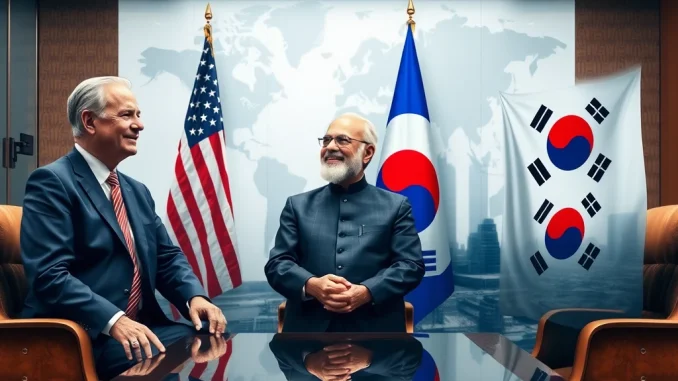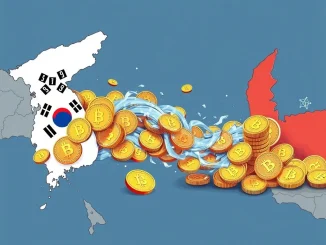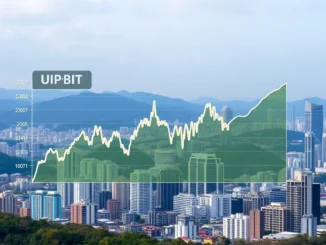
In the dynamic world of global economics, major trade discussions can send ripples through markets, and yes, that includes the cryptocurrency space. While not directly linked to digital assets, the stability and growth fostered by successful Global Trade Negotiations between major economic powers can significantly influence investor sentiment and overall market liquidity. Pay attention to key diplomatic movements, like the recent focus on USTR Greer‘s crucial meetings, as they signal potential shifts in international commerce that could indirectly shape the economic landscape crypto navigates.
Why Are USTR Greer’s Meetings So Important?
The United States Trade Representative (USTR) plays a pivotal role in shaping America’s trade policy and negotiating agreements with countries around the world. When the current USTR, Katherine Tai (referenced as Greer in the source snippet), schedules high-level meetings, it signals active efforts to advance U.S. economic interests abroad. These discussions aren’t just formalities; they address complex issues like market access, tariffs, intellectual property rights, and digital trade, all of which have tangible impacts on industries and economies.
The recent itinerary highlights a clear focus on strengthening ties with key Asian partners. First on the agenda is a significant meeting in India, followed by a trip to South Korea. This sequence underscores the strategic importance of these nations to U.S. trade objectives.
Deep Dive into India US Trade Discussions
On Tuesday, USTR Tai (Greer) was scheduled to meet with India’s Commerce Minister. The relationship between the United States and India is one of the most significant and rapidly evolving trade partnerships globally. India US Trade has grown substantially over the past two decades, but potential remains for further expansion. Discussions often revolve around:
- Reducing trade barriers and tariffs.
- Resolving disputes on specific goods or services.
- Enhancing cooperation in areas like technology and digital trade.
- Ensuring fair treatment for U.S. businesses operating in India and vice versa.
Making quick progress on these fronts can unlock new opportunities for businesses in both countries, potentially boosting economic activity. For market watchers, positive developments here can contribute to a more optimistic global economic outlook.
What’s on the Table for South Korea Trade?
Following the India meeting, USTR Tai (Greer) is set to travel to South Korea. South Korea is a vital U.S. economic ally, and the U.S.-Korea Free Trade Agreement (KORUS FTA) is a cornerstone of this relationship. Discussions concerning South Korea Trade often involve:
- Reviewing and implementing the existing KORUS FTA.
- Addressing new challenges in areas like supply chain resilience and emerging technologies.
- Ensuring fair competition and market access.
- Coordinating on regional economic strategies.
Maintaining a strong and mutually beneficial trade relationship with South Korea is crucial for U.S. economic stability and strategic positioning in the Indo-Pacific region. Progress in these talks reinforces confidence in established trade frameworks.
The Push for Quick US Trade Deals
In a CNBC interview, USTR Tai (Greer) reportedly emphasized the need for quick progress on US Trade Deals. This urgency likely stems from several factors:
- **Global Economic Headwinds:** Navigating post-pandemic recovery, inflation, and geopolitical tensions requires agile trade policies.
- **Competitive Landscape:** Other nations are actively pursuing their own trade agreements, making speed essential to secure advantageous positions.
- **Business Certainty:** Companies thrive on predictability. Expediting deal-making provides clearer rules of engagement for international commerce.
- **Domestic Priorities:** Delivering tangible results from trade negotiations aligns with domestic economic goals, such as job creation and consumer access to goods.
This focus on rapid progress indicates a proactive stance from the USTR office, aiming to finalize beneficial agreements efficiently rather than letting negotiations languish for years.
How Global Trade Negotiations Indirectly Influence Crypto Markets
While seemingly distant from Bitcoin or Ethereum, successful Global Trade Negotiations contribute to a more stable and prosperous international economy. Here’s how this connects, albeit indirectly, to crypto:
- **Investor Confidence:** Positive trade outcomes can boost overall market confidence, potentially leading investors to allocate capital more broadly across asset classes, including digital ones.
- **Economic Growth:** Stronger trade ties can spur economic growth in participating countries, increasing overall wealth and potentially driving demand for diverse investments.
- **Reduced Uncertainty:** Trade disputes and protectionist measures create economic uncertainty, which often leads investors to seek ‘safe haven’ assets or simply reduce risk exposure across the board. Resolving these issues can reduce this uncertainty.
- **Currency Stability:** While crypto operates independently of traditional currencies, major shifts in fiat currency strength, often influenced by trade balances and economic health, can impact crypto trading pairs and overall market dynamics.
Therefore, keeping an eye on significant trade developments, such as those involving USTR Greer and key partners like India and South Korea, provides valuable context for understanding the broader economic environment in which crypto markets operate.
Key Takeaways and What’s Next
USTR Tai’s (Greer’s) upcoming meetings with India’s Commerce Minister and subsequent trip to South Korea highlight the U.S.’s commitment to strengthening trade relationships in Asia. The emphasis on quick progress signals a desire to finalize beneficial agreements efficiently.
Benefits of Successful Talks:
- Increased market access for businesses.
- Potential reduction in tariffs and trade barriers.
- Enhanced cooperation on emerging economic issues.
- Greater stability in international trade relations.
Challenges Ahead:
- Resolving long-standing trade disputes.
- Balancing domestic interests with international commitments.
- Navigating complex geopolitical factors.
- Ensuring agreements are fair and enforceable.
For those following global markets, including crypto, these trade discussions are indicators of the health and direction of the traditional economy. While the direct link is tenuous, the indirect impact through market sentiment and overall economic stability is undeniable.
Conclusion: Trade Diplomacy in Action
The packed schedule for USTR Greer, focusing on pivotal meetings with India and South Korea, underscores the relentless pace of global trade diplomacy. The push for rapid progress on US Trade Deals reflects a strategic imperative to secure favorable terms and foster economic growth in a complex international environment. These high-stakes Global Trade Negotiations, while not explicitly about digital assets, form a critical part of the macroeconomic backdrop that influences capital flows and market confidence worldwide. Staying informed about these developments provides a broader perspective on the forces shaping the global economy, including the evolving landscape of digital finance.



